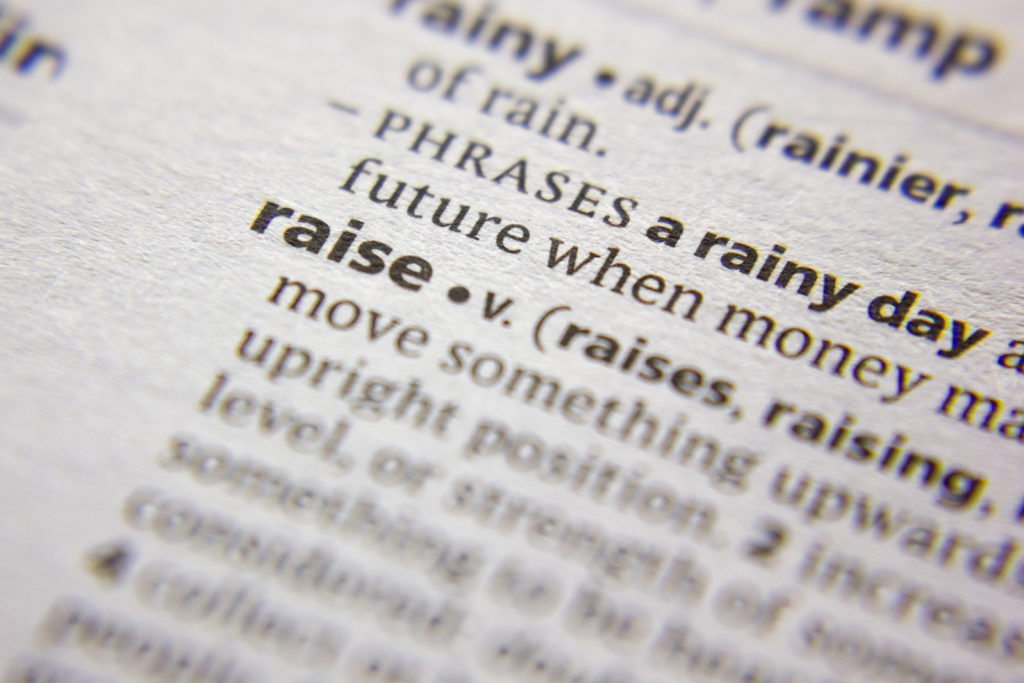Hello lovely students! Do you find that you get a bit confused whenever you need to use raise and rise? Do you get irritated that you don’t know the difference between them?
Well, look no further. I’m here to help you feel confident when using these two confusing words.
Ready to read more?

What does rise mean?
Rise is a useful word because it has lots of different meanings. This short word is an irregular verb and the pattern is rise, rose, risen for the present tense, past tense and past participle respectively.
Rise is an intransitive verb meaning it does not take a direct object.
Are you ready to see what rise means and some examples?
1) For an upward movement
The sun rises every day.
The feather rose into the air.
2) To get out of bed
I rise at 7am on weekdays.
Note: we usually use ‘get out of bed’ rather than ‘rise’, but it is important you know both.
3) To stand after sitting
She rose from her seat to shake our hands.
He had risen to answer the door before he fell.
4) When something increases in volume or numbers
The cost of living has risen.
When the river rose, we knew there would be a flood.
5) When emotions increase
My anger rises when I see injustice.
Her happiness rose as she thought of her friends.
6) When baked goods become higher in the oven
The bread should rise if you have made it properly.
You should never open the oven door when baking, as the goods may not rise.
7) To become successful
She rose through the ranks to a higher position and became CEO.
No one rose to power.
8) For courts and parliament
This is used in British English a lot. When we use rise with courts or parliament it means that the session has come to an end.
The court rose at 2 pm.
All rise please!

We also use rise as a noun.
1) For an increase
There was a rise in customers last year.
The temperature rose while I was on holiday, and it was great.
2) The process of becoming successful
His rise to fame meant he had enemies.
Their rise to power was a good thing.
3) A small hill
My house is on a small rise.
Be careful! There is a rise there so wear trainers.

Now that we have rise covered, let’s take a look at raise.
What does raise mean?
Raise means a lot of different things in the English language, much like rise. Raise is a transitive verb meaning it needs an object, and it is a regular verb too. The three forms are raise, raised, and raised.
Let’s take a look at some definitions and example sentences.
1) To lift something to a higher level
The students raised their hands in class.
Raise a glass to the bride and groom.
2) To take care of a living thing until they have grown
I’m a full-time parent, and I happily raise children as my job.
My farmer husband raises goats.
3) To cause something to become increase in level
If the school wants to stay open, it must raise the quality of the teachers.
I raised the volume of the television because I couldn’t hear it.
4) To obtain money from others for a cause
I want to raise this money for charity.
We can only work if we raise £100 for the new laptop.
5) To mention something for discussion
I wanted to raise a few questions about last week’s meeting.
He’d like to raise a few points about the new houses.
6) To make people start to think about something
His laughter raised suspicions I had about him.
Her realisation raised problems for her future.

Note: for these uses (5 and 6), we usually use the words point, suspicion, doubt, question, problem and fear.
American English and British English
A main difference between UK and US English is when we come to use raise vs rise as a noun to talk about salary.
In UK English, we use rise. I want to ask you for a pay rise because I work a lot.
However, in US English, they use raise. I want to ask you about a pay raise because I work a lot.
You have more than likely heard this on TV shows.

Raise vs rise: an overview
Look at the table below for an overview of the two words.
| Raise | Rise |
| Transitive verb | Intransitive verb |
| Regular verb | Irregular verb |
| Fewer noun uses | More noun uses |
| Used in American English as a noun for salary increase | Used in British English as a noun for salary increase |

Is that everything?
Absolutely not! Check out the youtube video below on my channel, English with Lucy for more confusing words.